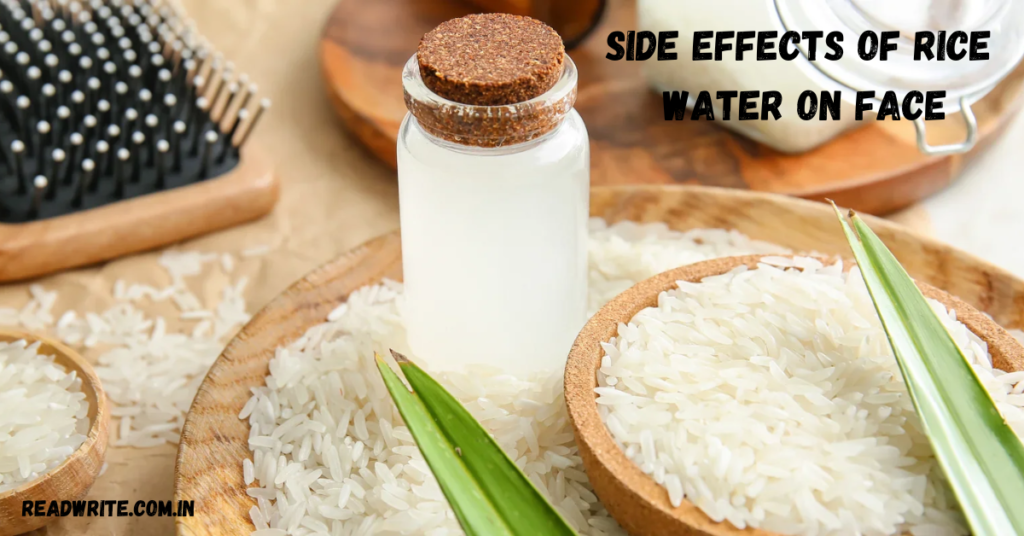Rice water has gained immense popularity in recent years as a natural remedy for skin and hair care. Its purported benefits include brightening the skin, reducing acne, and improving overall skin texture. While many swear by its effectiveness, it’s crucial to understand that rice water may not be suitable for everyone. In this article, we’ll explore the potential side effects of rice water on face using rice water on the face, the reasons behind them, and how to use it safely.
What is Rice Water?
Rice water is the starchy liquid left behind after soaking or boiling rice. Rich in vitamins, minerals, and amino acids, rice water has been used in Asian beauty routines for centuries. Its components include:
- Inositol: Known to repair damaged skin.
- Amino Acids: Essential for skin health.
- Antioxidants: Help combat free radicals.
- Vitamin E: Promotes hydration and healing.
Common Uses of Rice Water on Face
- Brightening Skin: Many believe rice water can lighten dark spots and give the skin a radiant glow.
- Reducing Acne: Its anti-inflammatory properties are thought to soothe acne-prone skin.
- Tightening Pores: Rice water is often used as a natural toner.
- Hydration: It’s believed to help maintain moisture levels in the skin.
While rice water has these potential benefits, it’s not entirely free from risks.
Side Effects of Rice Water on Face
1. Dryness and Flakiness
One of the most reported side effects of rice water on face of rice water is dryness. The high concentration of starch in rice water can strip natural oils from the skin, leading to dehydration. People with naturally dry or sensitive skin are more susceptible to this issue.
2. Breakouts
Ironically, rice water’s popularity for treating acne can backfire for some individuals. Its heavy starch content can clog pores, particularly in those with oily or acne-prone skin. This can lead to an increase in blackheads, whiteheads, or even cystic acne.
3. Allergic Reactions
Some individuals may experience allergic reactions to rice water. Symptoms can include redness, itching, swelling, or a burning sensation on the face. If you have sensitive skin or a history of allergies, it’s essential to perform a patch test before applying rice water to your face.
4. Over-Exfoliation
Rice water is sometimes used as an exfoliating agent due to its slightly abrasive texture. However, frequent or aggressive use can damage the skin’s protective barrier, causing irritation, sensitivity, and redness.
5. Irritation from Fermented Rice Water
Fermented rice water is often touted as being more potent, but its high acidity can irritate the skin. If not properly diluted, fermented rice water can disrupt the skin’s pH balance, leading to discomfort and sensitivity.
6. Fungal Infections
Improper storage of rice water can lead to bacterial or fungal growth. Applying contaminated rice water to your face can cause infections or exacerbate existing skin conditions.
7. Temporary Tightness
Some people report a feeling of tightness after using rice water, which can be uncomfortable. This is often due to the starchy residue left behind on the skin.
Who Should Avoid Rice Water?
While rice water may work wonders for some, it’s not suitable for everyone. The following individuals should exercise caution:
- People with Dry Skin: Rice water’s drying effect can worsen the condition.
- Individuals with Allergies: Always perform a patch test to avoid adverse reactions.
- Those with Active Acne: The starchy residue can clog pores and worsen breakouts.
- Sensitive Skin Types: The high starch content or fermentation process can irritate delicate skin.
How to Use Rice Water Safely on Face
If you’re intrigued by rice water’s potential benefits but want to minimize risks, follow these tips:
1. Perform a Patch Test
Apply a small amount of rice water to an inconspicuous area, like your wrist or behind your ear, and wait 24 hours to check for any allergic reactions.
2. Dilute Properly
Ensure rice water is well-diluted before applying it to your face. Undiluted rice water, especially fermented varieties, can be too harsh for the skin.
3. Use Moderately
Limit the use of rice water to 2-3 times a week. Overuse can strip the skin of its natural oils and lead to dryness.
4. Store Correctly
Refrigerate rice water in a clean, airtight container and use it within a week to avoid contamination.
5. Rinse Off
After applying rice water, rinse your face thoroughly to prevent starchy residue from clogging pores.
Alternatives to Rice Water
If rice water doesn’t work for your skin type or you’re wary of its side effects, consider these alternatives:
- Aloe Vera Gel: Hydrates and soothes skin without clogging pores.
- Rose Water: A gentle toner suitable for sensitive skin.
- Green Tea Extract: Packed with antioxidants, it combats inflammation and redness.
- Chamomile Water: Calms irritated skin and reduces sensitivity.
When to Consult a Dermatologist
If you experience persistent irritation, breakouts, or other skin issues after using rice water, consult a dermatologist. A professional can help identify the root cause and recommend suitable treatments or alternatives.
Conclusion
Side effects of rice water on face is a celebrated natural remedy with potential benefits for the skin, it’s not without its side effects. Dryness, breakouts, allergic reactions, and irritation are among the risks associated with its use, particularly for individuals with sensitive or acne-prone skin. To minimize these risks, use rice water cautiously and follow best practices for application and storage.
Ultimately, skin care is highly individual. What works for one person may not work for another. If you’re considering adding rice water to your skincare routine, ensure you’re informed about its potential drawbacks and consult a dermatologist for personalized advice.

